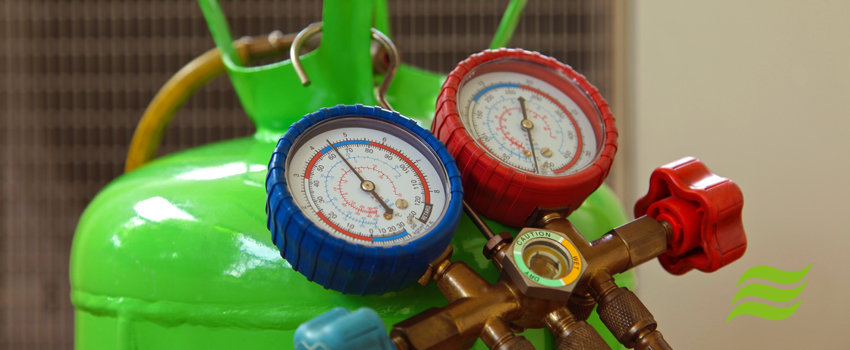
Need to Know AC Info: R22 Phaseout
⚠️ IMPORTANT UPDATE: New Refrigerant Changes in 2025
This article discusses the refrigerant R22 being replaced by R410A. As of 2025, R410A is being replaced by R454B. Learn about the R454B transition and what it means for your system in this blog post.
Do you know what refrigerant is used in your HVAC system?
Older HVAC units use a refrigerant called R22, also known as Freon. This refrigerant is now part of a federally regulated phaseout, which means it’s no longer going to be in use.
What does this mean for you?
Well, your HVAC repair bill is going to be a little more expensive if you have one of the older units if you have a leak.
The price of R22 has skyrocketed and will continue as supplies dwindle and eventually be nonexistent to the average consumer. What this means is you’re going to have to either pay the exorbitant prices for the gas or invest in getting a new system.
Newer units use the refrigerant R410A.
If your HVAC system is over ten years old, there is a very high possibility that your unit is using R22 and will have to be replaced.
Why is R22 being phased out?
R22 or Freon is a chemical called chlorodifluoromethane, and it's a hydrochlorofluorocarbon gas. Because of the way it’s chemically structured, R22 is considered to be a greenhouse gas.
Okay, that’s enough science! Basically, Freon can do serious harm to the ozone layer and is an environmentally hazardous material.
Restrictions have been in place since 2004 and increased again in 2010 to minimize the damage done to the environment.
The use of R22 was banned in all new HVAC systems, and now its production has been sharply cut. It is illegal to use R22 in any new system, and the gas is now banned entirely from being produced and used.
How to know if your HVAC system still uses R22
First, check your system’s label. If your system is over ten years old, then the chances are it probably uses R22. If you’re still not sure, look up the model online and find the manufacturer’s guide.
If your system does use R22, then it will be time to upgrade soon. Refrigerant is not a consumable, it doesn’t wear down, and you will not need to “top it off” ever. But if your tech tells you you are low on refrigerant, you have a leak. If you have a leak, more than likely, it will be financially wise to upgrade vs. repair – it’ll be less expensive (and less of a headache) in the long run. Your comfort advisor can help you based on your unique situation.
Is buying a new HVAC system cheaper than repairing your old one?
When it comes to older R22-using HVAC systems, yes, it is.
R22 is incredibly expensive to source now that it can no longer be manufactured – which means that any repairs or maintenance done on your air conditioning unit are going to be a whole lot more expensive than usual.
By investing your money into a new system that uses R410A or Puron, you’ll be able to save a lot more money versus sticking with your old system.
Can’t I just swap refrigerants?
If your air conditioning system runs on R22, you can’t just switch it to another refrigerant source it’ll be incompatible and might cause damage to your system.
Refrigerants all operate differently and need certain parts in your system to work properly.
You can get a retrofit completed by a technician, but this will cause any warranty you have with your manufacturer to be voided. There is a chance a retrofit won’t work – which means you’ll have to pay for a new unit anyway, plus the technician’s charges.
Signs you might need a new HVAC system
If your AC unit is over ten years old or hasn’t received regular maintenance, you might need to invest in a new unit. Proper maintenance will extend the life of your system and, while under warranty, will help you catch problems that can be covered by the manufacturer.
Here’s how you can tell if you need to invest in a new unit:
- There is constantly dust in your home – even after you’ve cleaned.
- Your system cannot maintain a consistent, comfortable temperature.
- Your air conditioner makes an excessive amount of noise.
- Your unit breaks down often and needs constant maintenance.
With a new HVAC system, you’ll be able to eliminate constant repair costs and lower your utility bills. You’ll also notice that your system will be more environmentally friendly, energy-efficient, and it will also help to increase the value of your home.
If you think your HVAC system is in need of a repair, maintenance, or replacement, give us a call on (703) 670-8519 to schedule your appointment or get in contact with us online.
New Refrigerant Changes in 2025
R22 (Freon)
- Used in: Units installed 1960s-2009
- Phased out: Production banned January 1, 2020
- Status: Existing supplies only, extremely expensive
R410A (Puron)
- Used in: Units installed 2010-2024
- Current status: Being phased out starting 2025
- Replacement: R454B
R454B (Puron Advance/Opteon XL41)
- Used in: New units beginning 2025
- Environmental benefit: 78% lower Global Warming Potential than R410A R-454B Refrigerant | R454B Refrigerant | Carrier
